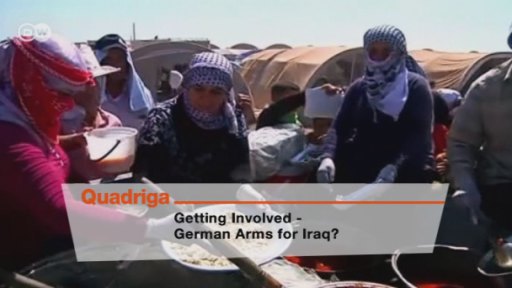Quadriga - Getting Involved - German Arms for Iraq?

This browser does not support the video element.
The Kurds in northern Iraq have proven to be reliable allies to western forces in the region, and many analysts view them as the only stable bulwark against Islamic State forces. The Kurds are too lightly armed to provide serious resistance to the advance of the jihadist movement troops, however, which have access to cutting-edge fighting technology – including modern American weapons systems seized from the Iraqi army. German weapons could place Kurdish troops on a more even footing in their battle against an IS advance.
But weapons don’t have a shelf-life. Long after a conflict ends, they remain in politically unstable regions like northern Iraq, and often end up in the hands of terrorists. The spread of machine guns and small arms is particularly difficult to control. According to UN estimates, these weapons alone kill several hundred thousand people every year.
After the US and Russia, Germany is the biggest arms exporter in the world, and the military industrial complex in the country employs thousands of people. As modern armies like the Bundeswehr shrink in size, arms suppliers are increasingly looking to the export market for revenue. Alongside the US, repressive governments in Qatar and Saudi Arabia are among the industry’s biggest customers.
Under the last government, Germany’s current Economy Minister Sigmar Gabriel helped push through legislation restricting the free trade in arms. Now members of the CDU –the conservative senior partners in Germany’s governing coalition – have begun criticizing the SPD politician for ‘endangering’ German interests linked with the arms export industry. Just last week, Chancellor Angela Merkel refused to consider possible exports to Iraq. Now she says all options are back on the table.
What do you think? Let us know at: quadriga(at)dw.de
Getting Involved - German Arms for Iraq?
Our guests:
Michael Stürmer - He is the senior correspondent at the German daily "Die Welt". He studied History, Philosophy and Languages in London, Berlin and Marburg. Stürmer taught History at Erlangen University and was a visiting professor at Harvard, Toronto, the Sorbonne and Bologna. In the 1980s Stürmer served as a political advisor to German Chancellor Helmut Kohl. He is the author of several key works on German, European and Russian history and politics.
Burkhard Birke – Studied economics at university and has been a journalist since 1982. Birke became the Washington correspondent for the German channel ARD in 1988. He has also reported from Brussels, London and Paris and today he is the Berlin correspondent for Germany's public broadcasting radio network, Deutschlandradio Kultur.
Kristin Helberg - She studied political science and Journalism in Hamburg and Barcelona. First she was a freelance correspondent in Syria from 2001 to 2009. She worked for various radio stations such as ARD, DRS and ORF, as well as for German newspapers such as die Tageszeitung. In 2009 she returned to Germany and lives in Berlin where she works as a freelance journalist. Her main emphasis still focuses on the Middle East and she travels and reports from there regularly.